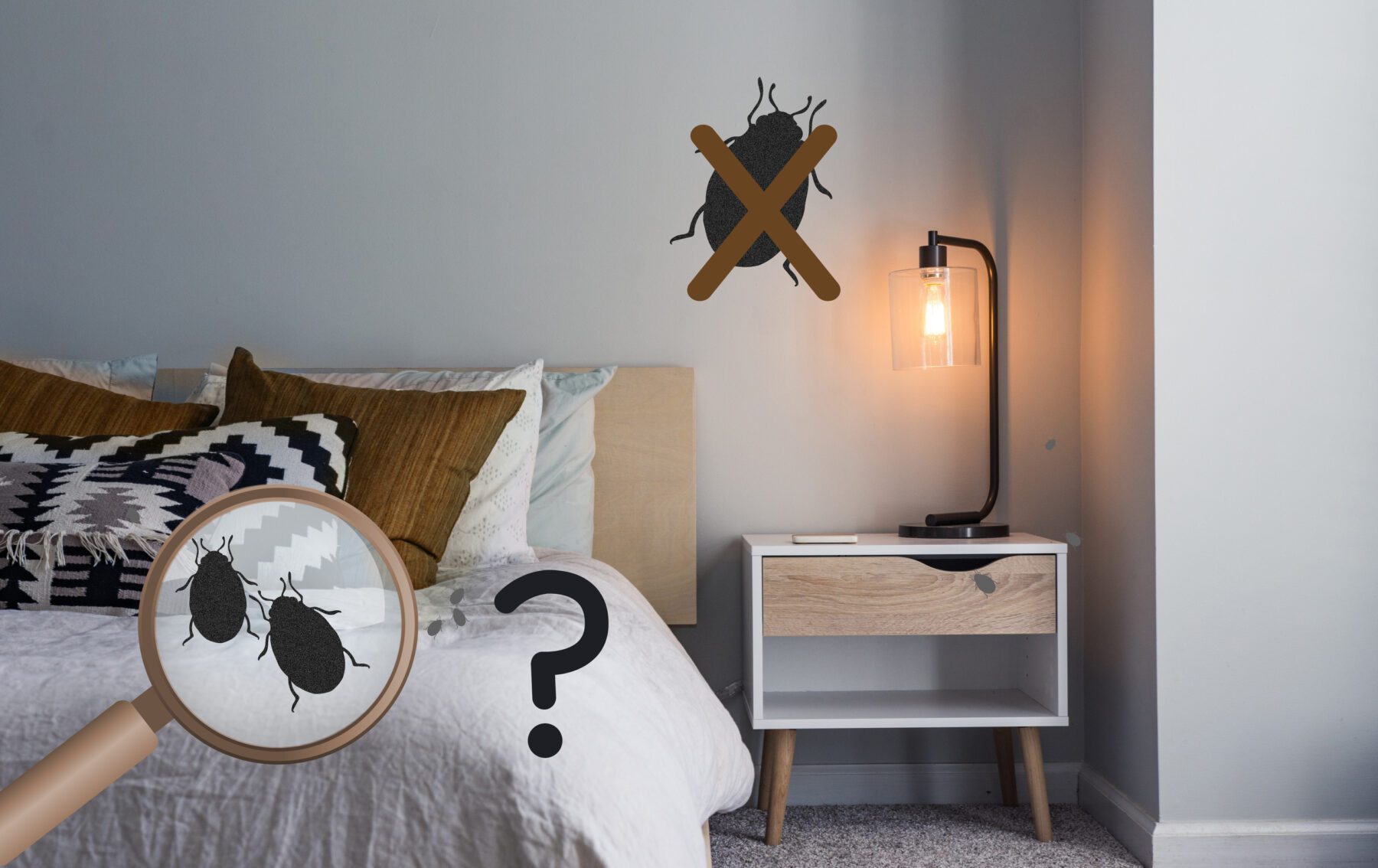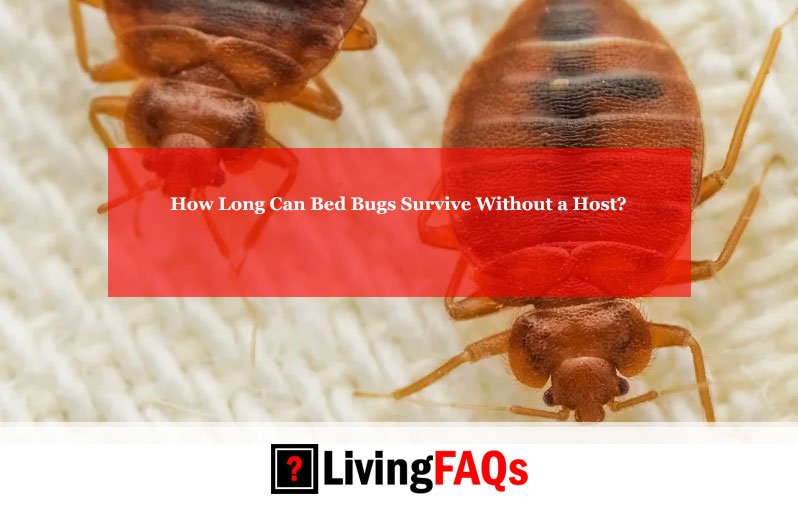Bed bugs can survive in an empty house for up to 20 weeks. They endure by entering a semi-hibernation state called diapause.
Dealing with bed bugs is a common concern for homeowners and tenants alike. These pesky insects are known for their resilience and ability to thrive in various environments. An empty house does not equate to a bug-free zone; bed bugs are survivors that can live without a food source for several months.
Understanding their survival tactics is crucial for effective pest control. Homeowners often face the challenge of eradicating bed bugs after prolonged absences, finding that these insects have outlasted the vacancy. This knowledge is vital for those in real estate or anyone planning to leave a property unoccupied for an extended period. Effective prevention and treatment strategies become essential to ensure that returning to a home doesn’t include unwelcome guests.

Credit: bedbugbbq.com
Bed Bug Basics
Understanding bed bugs is key to controlling them. These tiny pests can outlast expectations in empty homes. Let’s explore their characteristics and habits.
Physical Characteristics
Bed bugs are small, wingless insects. Their bodies are oval-shaped and flat. They grow to about 5mm in length, roughly the size of an apple seed. Adults have a reddish-brown color after feeding.
Life Cycle And Feeding Habits
Bed bugs have three life stages: egg, nymph, and adult. The female lays white, oval eggs. Nymphs hatch from eggs and molt five times before becoming adults.
They feed on blood, usually at night. Each feeding lasts about 10 minutes. Bed bugs can survive months without a meal. This makes empty houses a hidden refuge for them.
Survival Mechanisms
Bed bugs are tiny, but they are survival experts. Let’s explore how they manage to live for so long in an empty house. We will look at their adaptation to starvation and resilience factors.
Adaptation To Starvation
Bed bugs can survive without food for a long time. They do this by slowing down their metabolism. This means they use less energy and need less food.
- Adult bed bugs can live up to a year without a meal.
- Nymphs, or young bed bugs, can survive several months.
This adaptation helps them wait for their next meal, even if it takes a while.
Resilience Factors
Bed bugs are not just good at surviving without food. They have other skills that help them live long in empty houses.
| Factor | Description |
|---|---|
| Temperature Tolerance | They can live in many temperatures, from very cold to warm. |
| Hiding Skills | Bed bugs hide in cracks and small spaces, staying safe. |
| Reproduction Rate | Once they find food, they reproduce quickly, making more bugs. |
These factors make bed bugs tough to get rid of, even in empty houses.
Factors Influencing Survival
Understanding the survival of bed bugs in an empty house requires examining key factors. These factors determine how long these pests can live without a food source. Let’s explore the main elements that influence bed bug survival.
Temperature And Humidity
Bed bugs thrive in certain climates. Ideal conditions can prolong their lifespan. The right blend of temperature and humidity is crucial. Warm environments usually mean longer life for bed bugs. Conversely, extreme heat or cold can shorten it.
- High temperatures accelerate metabolism but require more feeding.
- Low temperatures can lead to dormancy, reducing food need.
Humidity also plays a part. Moderate levels support bed bug life. Too dry or too damp settings disrupt their survival.
Age And Health Of Bed Bugs
The age and health of bed bugs affect their resilience. Younger bed bugs, called nymphs, are more vulnerable without a host. Adults, especially healthy ones, can survive longer. Their ability to resist starvation is stronger.
| Life Stage | Survival without Host |
|---|---|
| Nymphs | Less resilient |
| Adults | More resilient |
Overall health is vital. Bed bugs with prior regular feeding fare better in absence. Those already weakened struggle more.

Credit: www.wikihow.com
Typical Survival Timeframes
Exploring the resilience of bed bugs reveals their survival tactics in empty homes. Let’s dive into their typical survival timeframes.
Without A Blood Meal
Bed bugs are infamous for their survival skills. These pests can endure long periods without feeding. Adult bed bugs can survive up to a year in a vacant house. In contrast, younger bed bugs, or nymphs, need more frequent meals to grow. They can only last for several months without a blood meal.
- Adults: Up to 12 months
- Nymphs: A few months
Extreme Conditions
Bed bugs are surprisingly hardy creatures. Their survival time can extend in cooler environments. Lower temperatures slow down their metabolism, reducing their need to feed. Nevertheless, extreme heat or cold can be lethal to bed bugs. Temperatures above 120°F or below 32°F can kill bed bugs within minutes.
| Condition | Survival Impact |
|---|---|
| Cooler Temperatures | Extended survival |
| Extreme Heat (>120°F) | Fatal within minutes |
| Extreme Cold (<32°F) | Fatal within minutes |
Detecting Dormant Bed Bugs
Detecting dormant bed bugs in an empty house can be tricky. These tiny pests can live without food for months. Knowing the signs and how to search is key. Let’s explore how to spot and find these hidden critters.
Signs Of Inactivity
Even when bed bugs are not active, they leave clues. Look for these:
- Fecal spots: Small, dark stains on surfaces.
- Exoskeletons: Shed skins from growing bugs.
- Eggs: Tiny, white specks in cracks or crevices.
- Musty odor: A sweet, rotten smell from their scent glands.
Search Techniques
Follow these steps to search for dormant bed bugs:
- Use a flashlight: Look in dark, hidden places.
- Check seams: Inspect the seams of mattresses and furniture.
- Examine cracks: Look in wall cracks and crevices.
- Use sticky traps: Place traps around the house to catch them.
Remember, patience is key. Finding dormant bed bugs takes time.
Implications For Infestation Control
Understanding bed bug survival in empty houses is crucial.
It informs treatment and prevention.
Bed bugs can live months without a host.
This persistence complicates infestation control.
Treatment Timing
Effective control requires strategic timing.
Treatments should account for bed bug life cycles.
Delayed treatment allows populations to rebound.
- Inspect regularly, even in vacant properties.
- Apply treatments when bed bugs are most vulnerable.
- Repeat treatments may be necessary.
Preventive Strategies
Prevention is better than cure.
Keep empty houses bed bug-free with these strategies.
| Strategy | Details |
|---|---|
| Seal entry points | Cracks and crevices should be sealed. |
| Regular cleaning | Dust and vacuum to remove stray bugs. |
| Climate control | Maintain low humidity to deter infestation. |
Myths Vs. Facts
Exploring the lifespan of bed bugs in an empty house stirs up many myths. Let’s debunk myths and present facts about these resilient pests.
Common Misconceptions
Many believe bed bugs need constant human presence to survive. This is not true. Bed bugs can live for months without feeding. Some think cold temperatures kill them quickly. Bed bugs actually can endure for weeks in cool conditions.
Bed bugs vanish without clutter. This is a myth. Clutter provides hiding spots, but bed bugs can survive without it. Another misconception is that bed bugs transmit diseases. No evidence supports this claim.
Scientifically Proven Data
Research shows bed bugs can survive without a human host for up to one year. This is under ideal conditions. In normal conditions, the survival period is shorter. Temperature and humidity affect their lifespan.
| Condition | Lifespan Without Food |
|---|---|
| Optimal | Up to 1 year |
| Normal | 2-6 months |
| Cool | Weeks |
Studies confirm that bed bugs can endure long periods of vacancy. They enter a semi-hibernation state, called diapause. This conserves energy. Younger bed bugs need more frequent meals. Adults survive longer without blood.

Credit: bedbugbbq.com
Preparation For Absences
Planning to leave your home unoccupied? It’s important to understand how bed bugs thrive in such conditions. These pesky insects can survive for months without a meal, making Preparation for Absences crucial to prevent an infestation upon return. Let’s explore steps to take before locking up.
Vacation Considerations
Before jetting off, consider these tips:
- Inspect your space for any signs of bed bugs.
- Wash all fabrics in hot water and dry on high heat.
- Vacuum rooms thoroughly, focusing on hidden spots.
- Seal cracks and crevices where bugs might hide.
Property Management Tips
For landlords and property owners:
- Regular inspections are key to early detection.
- Professional treatments ensure a bug-free environment.
- Inform tenants about prevention measures.
- Maintain records of any pest control actions.
Frequently Asked Questions
Can Bed Bugs Survive Without Humans?
Bed bugs can live for several months without a human host, relying on their ability to enter a dormant-like state called diapause.
How Long Do Empty Homes Harbor Bed Bugs?
In an unoccupied house, bed bugs can survive up to a year or more under favorable conditions, due to their slow metabolism when inactive.
What Factors Affect Bed Bug Longevity?
Temperature, availability of a food source, and humidity levels are key factors that influence how long bed bugs can live in an environment.
Do Bed Bugs Die Off In Vacant Homes?
Bed bugs may eventually die in a vacant home, but this process can take many months due to their ability to conserve energy and survive without feeding.
Can Regular Cleaning Eliminate Bed Bugs?
Regular cleaning can help reduce bed bug populations but is unlikely to completely eliminate them without targeted extermination methods.
Conclusion
Understanding the resilience of bed bugs in an unoccupied home is crucial. These pests can survive months without a meal, making thorough extermination key. For homeowners, regular inspections and professional treatments are essential steps. Remember, defeating bed bugs takes persistence and knowledge.
Stay informed and proactive to keep your living spaces pest-free.

